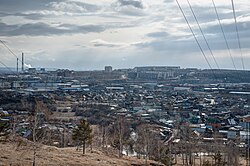Irkutsk
| Irkutsk (English) Иркутск (Russian) |
|
|---|---|
| - City - | |
 Industrial panorama in Irkutsk |
|
 Location of Irkutsk Oblast in Russia |
|
|
|
|
|
|
|
|
|
|
| Anthem | none |
| City Day | First Saturday of June |
| Administrative status (as of December 2014) | |
| Country | Russia |
| Federal subject | Irkutsk Oblast |
| Administratively subordinated to | City of Irkutsk |
| Administrative center of | Irkutsk Oblast,Irkutsky District, City of Irkutsk |
| Municipal status (as of December 2004) | |
| Urban okrug | Irkutsk Urban Okrug |
| Administrative center of | Irkutsk Urban Okrug, Irkutsky Municipal District |
| Mayor | Dmitri Berdnikov |
| Representative body | Duma |
| Statistics | |
| Area | 277 km2 (107 sq mi) |
| Population (2010 Census) | 587,891 inhabitants |
| - Rank in 2010 | 24th |
| Density | 2,122/km2 (5,500/sq mi) |
| Time zone | IRKT (UTC+08:00) |
| Founded | 1661 |
| Postal code(s) | 664xxx |
| Dialing code(s) | +7 3952 |
|
|
|
| on | |
Irkutsk (Russian: Иркутск; IPA: [ɪrˈkutsk]) is a city and the administrative center of Irkutsk Oblast, Russia, and one of the largest cities in Siberia. Population: 587,891 (2010 Census);593,604 (2002 Census);622,301 (1989 Census).
In 1652, Ivan Pokhabov built a zimovyo (winter quarters) near the site of Irkutsk for gold trading and for the collection of fur taxes from the Buryats. In 1661, Yakov Pokhabov built an ostrog or small fort nearby. The ostrog gained official town rights from the government in 1686. The first road connection between Moscow and Irkutsk, the Siberian Road, was built in 1760, and benefited the town economy. Many new products, often imported from China via Kyakhta, became widely available in Irkutsk for the first time, including gold, diamonds, fur, wood, silk, and tea. In 1821, as part of the Speransky reforms, Siberia was administratively divided at the Yenisei River and Irkutsk became the seat of the Governor-General of East Siberia.
In the early 19th century, many Russian artists, officers, and nobles were sent into exile in Siberia for their part in the Decembrist revolt against Tsar Nicholas I. Irkutsk became the major center of intellectual and social life for these exiles, and much of the city's cultural heritage comes from them; many of their wooden houses, adorned with ornate, hand-carved decorations, survive today, in stark contrast with the standard Soviet apartment blocks that surround them.
...
Wikipedia



